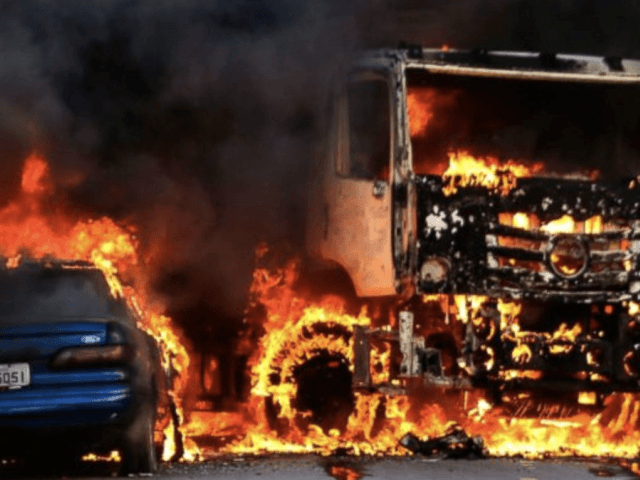The government of President Jair Bolsonaro deployed troops to Ceará, northern Brazil this weekend to combat widespread violence, theft, and property destruction by some of the country’s most violent criminal gangs.
On Sunday, Bolsonaro’s justice secretary Sergio Moro confirmed that 300 troops would patrol the city of Fortaleza and other towns in Ceará state following a spate of violent attacks by criminal gangs against banks, buses, shops, and security equipment.
“The decision was made after the recorded violence and the difficulty [faced by] local forces fighting organized crime alone,” the ministry said in a statement.
In videos published across social media, gangs were seen terrorizing Fortaleza by setting cars and buses alight and attacking petrol stations, forcing local residents to seek refuge at home. Two people were killed in a shootout with police, while over 100 people have were arrested over for their involvement.
“Moro was very skilled, very quick and effective to attend [to] even a state whose re-elected governor has a radical position [against] us,” Bolsonaro said on Friday, after Ceará’s leftist governor Camilo Santana requested “urgent” reinforcement from federal authorities.
Although the motive for the violence is not entirely clear, early intelligence reports indicate it could be a response to recent measures imposed in the state’s prisons, which include a block on mobile phone signals and an end to a policy of housing inmates according to their gang affiliation.
Brazil’s drug gangs, many of them operating out of prison, are known as some of the most powerful and brutal in the world. The three largest gangs are the Red Command (CV) that grew out of organized crime syndicates in Rio de Janeiro, the First Command of the Capital (PCC) from Sao Paulo, and a group called the Guardians of the State (GDE). Although CV and PCC are rival gangs, they agreed to form a “non-aggression” pact against each other in Ceara so they could focus their energy against government forces.
The violence in Ceará echoes the chaos Brazil’s northwestern Manaus and Roraima at the beginning of 2018. A turf war between the CV and the PCC triggered gruesome violence in the overpopulated Anisio Jobim Prison Complex in Manaus, deep in the Amazon region. Rival gang members set each other on fire and organized “barbecues” to eat the burnt flesh of opposition gang members.
Some prisoners cut the hearts of enemies out while they were still alive or beheaded them, tossing the bodies over the gates of the prison to warn outsiders and police officers not to come in. The government failed to stop the slaughters until their eventually died down. Dozens of prisoners escaped, some so confident the police had no resources to re-arrest them that they posted romantic solicitations on social media.
A tough approach to law and order formed a signature part of Bolsonaro’s campaign platform. Some of his proposals for tackling the issue included expanding the military’s presence on the streets, harsher prison sentences, and giving the police more autonomy to open fire on suspected criminals.
As well as tackling violent crime, Bolsonaro also promised to push for the prosecution of the dozens of socialist politicians involved in the country’s “Operation Car Wash” corruption scheme that saw billions of pounds fleeced from the public budget. The scandal’s most significant participant was former leftist President Luiz Inácio Lula Da Silva, who Bolsonaro has pledged to keep in jail for the remainder of his 12-year sentence.
Follow Ben Kew on Facebook, Twitter at @ben_kew, or email him at bkew@breitbart.com.

COMMENTS
Please let us know if you're having issues with commenting.